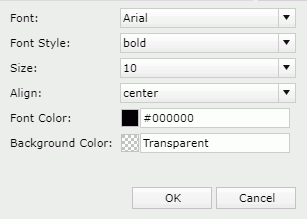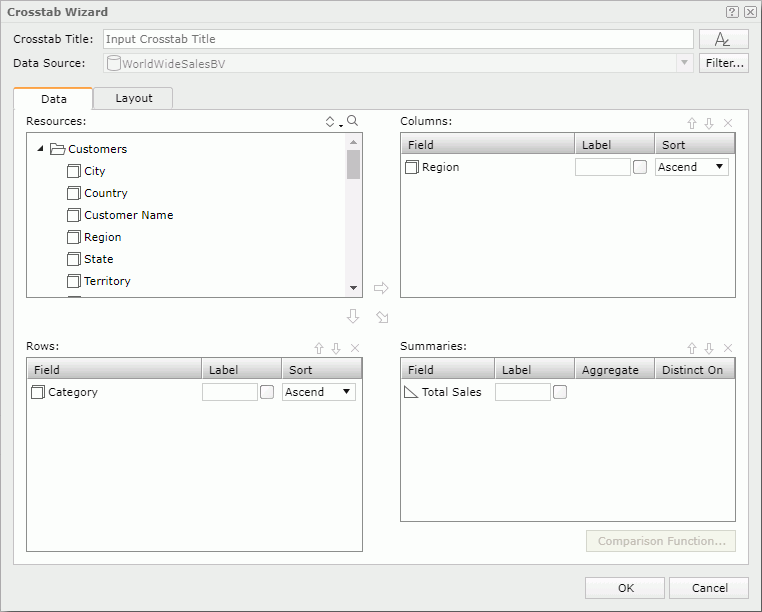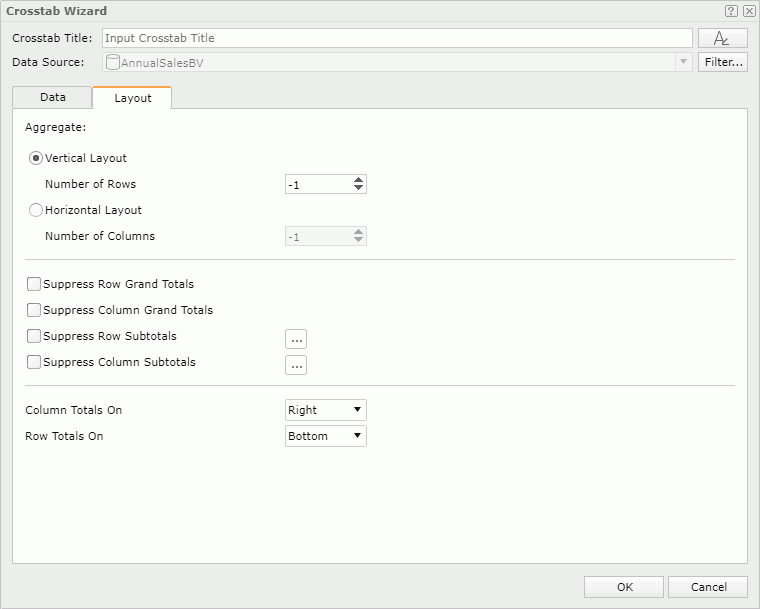Crosstab Wizard
The Crosstab Wizard is used to change data of a crosstab. It contains the Data and Layout tabs.
This wizard appears when you do one of the following:
- Select a crosstab, then select Menu > Edit > Wizard.
- Select a crosstab, then select the Crosstab Wizard button
 on the visualization toolbar.
on the visualization toolbar. - Right-click the icon
 of a crosstab and select Crosstab Wizard from the shortcut menu.
of a crosstab and select Crosstab Wizard from the shortcut menu.
Crosstab Title
Specifies a title for the crosstab.

Specifies the font properties of the crosstab title. After you select the button, Report Server displays the following dialog box for you to edit the font properties:

- Font
Specifies the font face of the title. - Font Style
Specifies the font style of the title. It can be one of the following: regular, bold, italic, and bold italic. - Size
Specifies the font size of the title. - Align
Specifies the position of the title to be left, right, center, or justify. - Font Color
Specifies the font color of the title. - Background Color
Specifies the background color of the title.To specify a color, click the color image to select a color from the color palette, or select More Colors in the color palette to select a color using the Color Picker dialog.
- OK
Accepts the color settings and closes the dialog. - Cancel
Cancels editing the color and closes the dialog
Data Source
Displays the business view used by the crosstab.
Filter
Opens the Query Filter dialog box to specify the filter which you want to apply to the selected business view.
OK
Applies the changes and closes the wizard.
Cancel
Does not retain changes and closes the wizard.

Displays the help document about this feature.

Ignores the setting and closes this dialog box.
Data Tab
Specifies the column, row and aggregate fields to display in the crosstab.

Resources
Displays the view elements in the selected business view.

Sorts the view elements in the specified order from the drop-down list. Once a user changes the order, it will be applied to all the resource trees where business view elements are listed for this user.- Predefined Order
Sorts the view elements in the order defined in the Business View Editor on Logi Report Designer. - Resource Types
Sorts the view elements by resource type, namely category objects come first, then group objects, then aggregation objects, and at last detail objects. - Alphabetical Order
Sorts the view elements in alphabetical order. Elements that are not in any category will be sorted first, then the categories, and the elements in each category will also be sorted alphabetically.
- Predefined Order

Launches the search bar to search for view elements.- Text box
Type in the text you want to search in the text box and the values containing the matched text will be listed. - X
Closes the search bar. 
Lists more search options.- Highlight All
Specifies whether to highlight all matched text. - Match Case
Specifies whether to search for text that meets the case of the typed text. - Match Whole Word
Specifies whether to search for text that looks the same as the typed text.
- Highlight All

When Highlight All is selected, you can use this button to go to the previous matched text.
When Highlight All is selected, you can use this button to go to the next matched text.
The following shows the options in the search bar:

Columns/Rows
Specifies the column/row fields to display in the crosstab.
- Field
Lists the group objects that will be displayed in the columns/rows of the crosstab. - Label
Specifies the text of the labels for the column/row headers. You can select the text boxes to edit the label text, or select the Auto Map Field Name check boxes beside the text boxes to automatically map the label text to the dynamic display names of the objects. - Sort
Specifies the sort order of the group objects.
Summaries
Specifies the aggregate fields to display in the crosstab.
- Field
Lists the aggregation/detail objects that you select to create summaries. - Label
Specifies the text of the labels for the summaries. You can select the text boxes to edit the label text, or select the Auto Map Field Name check boxes beside the text boxes to automatically map the label text to the dynamic display names of the objects. - Aggregate
Specifies the functions used to summarize data of the detail objects. - Distinct On
Available and should be set when DistinctSum is selected as the aggregate function. It specifies the detail objects according to whose unique values to calculate DistinctSum. Select to select the detail objects in the Select Fields dialog box.
to select the detail objects in the Select Fields dialog box. - Comparison Function
Opens the Comparison Function dialog box to add a comparison function as an aggregate for the crosstab.

Adds the selected group object  to be displayed on the columns of the crosstab.
to be displayed on the columns of the crosstab.

Adds the selected group object  to be displayed on the rows of the crosstab.
to be displayed on the rows of the crosstab.

Adds the selected aggregation object  or detail object
or detail object  to be the summary field of the crosstab.
to be the summary field of the crosstab.

Moves the selected view element one level up.

Moves the selected view element one level down.

Removes the selected resource.
Layout Tab
Specifies the layout of the crosstab.

Aggregate
Specifies properties of the aggregate fields.
- Vertical Layout
If selected, the aggregate fields will be arranged vertically.- Number of Rows
Specifies the number of rows to hold the aggregate fields in the crosstab. By default, it is -1 which means that each aggregate field is placed in a row so that the aggregate fields are positioned in one column vertically. 0 and a number equal to or larger than the number of aggregate fields in the crosstab are treated as -1. If you set the number of rows (3 for example) less than the number of aggregate fields (6 for example), there will be 3 rows to hold the 6 fields with each row containing 2 fields.
- Number of Rows
- Horizontal Layout
If selected, the aggregate fields will be arranged horizontally. When you have multiple aggregate fields in the crosstab, using horizontal layout can make the report more readable.- Number of Columns
Specifies the number of columns to hold the aggregate fields in the crosstab. By default, it is -1 which means that each aggregate field is placed in a column so that the aggregate fields are positioned in one row horizontally. 0 and a number equal to or larger than the number of aggregate fields in the crosstab are treated as -1. If you set the number of columns (3 for example) less than the number of aggregate fields (6 for example), there will be 3 columns to hold the 6 fields with each column containing 2 fields.
- Number of Columns
Suppress Row Grand Totals
Specifies whether or not to show the grand total row in the crosstab.
Suppress Column Grand Totals
Specifies whether or not to show the grand total column in the crosstab.
Suppress Row Subtotals
Specifies whether or not to show the subtotals of the row fields in the crosstab. You can select  to customize which subtotals of the row fields will be suppressed and which will be shown in the Suppress Row Subtotals dialog box.
to customize which subtotals of the row fields will be suppressed and which will be shown in the Suppress Row Subtotals dialog box.
Suppress Column Subtotals
Specifies whether or not to show the subtotals of the column fields in the crosstab. You can select  to customize which subtotals of the column fields will be suppressed and which will be shown in the Suppress Column Subtotals dialog box.
to customize which subtotals of the column fields will be suppressed and which will be shown in the Suppress Column Subtotals dialog box.
Column Totals On
Specifies the position of subtotal and grand total columns on the left or right of the detail aggregations.
Row Totals On
Specifies the position of subtotal and grand total rows on the top or bottom of the detail aggregations.
 Previous Topic
Previous Topic